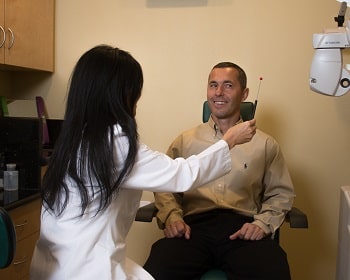Many people know about the damage that ultraviolet (UV) rays can have on the skin, from sunburns to skin cancers. But many may not know about the damage it may cause to the eyes. That is why Prevent Blindness, the nation’s oldest eye health and safety organization, has declared May as UV (ultraviolet) Awareness Month. The goal is to help educate the public on the dangers of UV and steps to take to protect vision today and in the future.
So, what does ultraviolet radiation do to our eyes?
UVA is especially damaging to the inside of your eye. In particular, the macula. That’s the part of your eye that gives you your central vision — your sharpest vision. UVB causes damage to the front of your eye. The cornea (the clear “bubble” that covers the colored part of your eye) and your eye’s natural lens.
Together, here’s the problems that they can cause:
PINGUECULA
We see this a lot in people from equatorial and tropical regions, especially those who spend many hours outside. A pinguecula is a growth on the surface of the eye. In most cases, it is a cosmetic issue, as they have a tendency to become red and irritated. Pinguecula can grow onto the cornea and encroach on your vision. At that point they are called a Pterygium and can be surgically removed.
SKIN CANCERS
We know that UV can cause skin cancer, including the area around our eyes and eyelids. In fact, 99% of non-melanomas and 95% of melanomas are caused by overexposure to the sun! The eyelid is actually one of the most common places for skin cancers to occur.
CATARACTS
Cataracts will generally occur in everyone’s eyes sooner or later. They are a natural part of those trips around the sun that we take. They can also be enhanced by exposure to UVB radiation. Cataracts can be surgically removed with good results, but why rush them along? The World Health Organization estimates that up to 20 percent of cataracts may be caused by overexposure to UV radiation.
MACULAR DEGENERATION
Again, macular degeneration can be an age-related issue. But it can also be strongly affected by UV exposure. Unlike cataracts, there is no “easy” fix for macular degeneration. There are treatments for the condition. The progression can be slowed down. Existing damage, however, can rarely be reversed and there is no known cure.
PHOTOKERATITIS (Corneal Sunburn)
This can be caused by intense, short-term exposure to ultraviolet radiation. Sunlight reflecting off of water, sand, snow and ice can cause this painful condition. So can staring at the sun – like watching a solar eclipse without using a device made specifically for you to do so safely. Unprotected use of tanning beds and lamps and arc welders can also burn the delicate tissues of the eye.
As stated before, protection from ultraviolet radiation is simple. Most types of eyewear have some type of “filter” that absorbs UV.
Even clear eyeglass lenses can be treated to protect your eyes. Many contact lenses now provide UV protection, but that is very limited. Sunglasses are always the best option for contact lens wearers.
How to Choose Protective Sunglasses
For sufficient UV defense, sunglasses should completely block all UV rays. Stick with shades that specify they are ''UV 400'', which indicates that they block all light rays with wavelengths up to 400 nanometers (which includes both UVA and UVB rays, both known to enter the atmosphere).
You also want to choose sunglasses with full eye coverage. Wraparound sunglasses can block harmful ultraviolet light from coming in through the backside of the sunglasses.
Those whose work or recreation involves extensive exposure to light from the sun are at the most risk for UV eye damage. UV can be reflected from bright areas such as snow, water, and white sand and presents the greatest threat from 10 am to 3 pm and during the summer months. UV radiation levels increase as you get closer to the equator and at high altitudes.
It's important to consult with an optometrist and to be aware of the hazards of UV exposure. Simply putting on your sunglasses can be the answer to saving your precious vision.
Sunglasses should be worn in conjunction with a brimmed hat. Wrap-around sunglasses are best as they protect not only the eyes but the delicate skin around the eyes as well.
Make your appointment today
To make your appointment, simply give us a call (760)-948-3345 or
or
Due to COVID-19 safety protocols, all eyewear services are currently by appointment only. Please call to make an appointment.
At Golden Eye Optometry, we view good vision care as front line protection at every age. A routine eye exam can detect more than poor vision. It can shed early light on glaucoma, macular degeneration, cataracts and diabetes.
